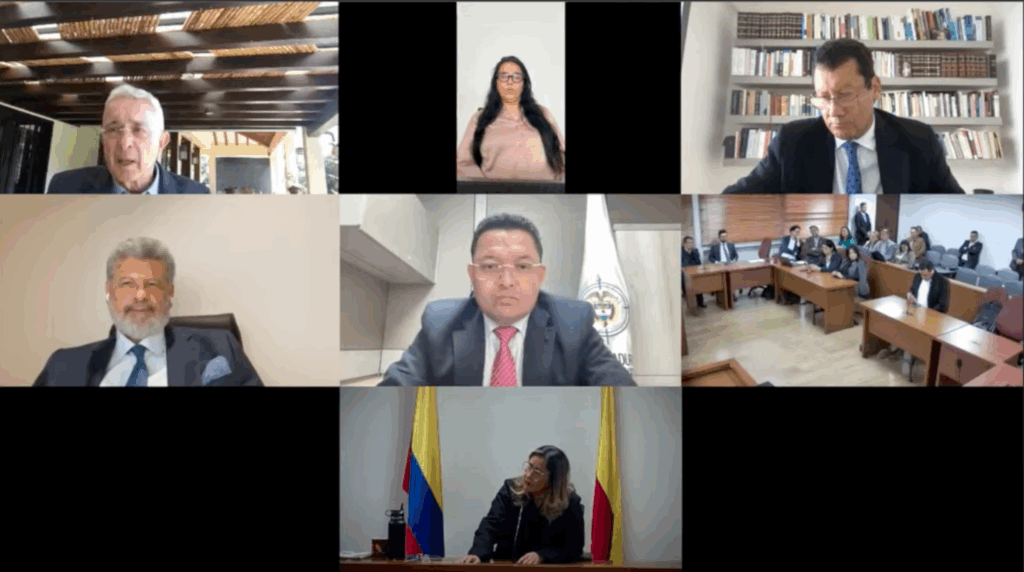Medellín, Colombia – Álvaro Uribe Vélez, who served as president of Colombia from 2002 to 2010, has been sentenced to 12 years of house arrest after being found guilty of bribing a witness and procedural fraud.
Judge Sandra Heredia also fined the politician with 2,420 minimum salaries- amounting to 3,447,290,000 Colombian pesos ($835,120 USD)- and barred him from public office for over 8 years.
Uribe, 73, was granted house arrest due to his age, which he must comply with “immediately”. To make it effective, however, he must pay an additional judicial insurance policy of 5,694,000 pesos ($1,380.36 USD).
The right-wing leader’s sentencing follows Monday’s court hearing in which Heredia found him guilty of two of the three charges for which he stood accused: bribery in criminal proceedings and procedural fraud. Uribe was acquitted of a third charge of simple bribery.
According to Colombian radio station Caracol Radio, the difference between both bribery charges lies in the nature of the act; whereas bribery in criminal proceeding involves bribing someone who witnessed a criminal offense, simple bribery concerns offering benefits to persuade someone’s actions for the benefit of the briber.
Uribe used his former lawyer, Diego Cadena, to offer legal benefits to imprisoned ex-paramilitaries in exchange for statements denying his involvement in the creation of the Bloque Metro (Metro Bloc), a right-wing paramilitary group.
The court found that Uribe had encouraged the presentation of false or manipulated evidence to influence a decision of the Supreme Court, for which he was convicted of procedural fraud.

Image source: Álvaro Uribe Vélez via YouTube.
Although the former president had remained notably silent in the days following Monday’s court session, on July 31 his legal team denounced current President Gustavo Petro for “harassment and slander” before the Investigations and Accusations Commission of the Chamber of Representatives, tasked with investigating accusations against heads of state.
“President Petro made direct, unfounded accusations which lacked judicial support, in which he attributed serious criminal conduct to ex-President Uribe like homicides, drug trafficking, paramilitarism, and corruption. There is no criminal conviction or judicial decision to support such claims,” noted law firm Víctor Mosquera Marín Abogados, which represents Uribe, in a press release from August 1.
“Such conduct represents a clear violation of the constitutional and international limits of freedom of expression,” the firm continued.
In the days following Uribe’s conviction, Petro had publicly criticized the former president.
“Ex-President Uribe did not fight paramilitary terrorism; he negotiated with it, multiple times,” Petro said on July 29 through X.
Uribe’s supporters have taken to social media to reaffirm their support for the former president. Gabriel Jaime Vallejo, who currently directs the Uribe-founded Democratic Center party, deemed the sentencing a case of lawfare.
“We are thinking of appealing to international organizations because, from the start, this process has evidenced lacking procedural guarantees,” Vallejo stated while in conversation with Colombian radio station Blu Radio.
A march was also convened by the Democratic Center for August 7. “We will march for Álvaro Uribe Vélez, for democracy, and liberties in Colombia,” the party shared.
Additionally, a letter signed by 28 former heads of state from Iberoamerican countries was sent to the United Nations, the Organization of American States, and the Inter-American Commission of Human Rights, urging them to monitor the case and defend Uribe, whom they described as “innocent.”
“We turn to you so that, within the scope of your authority, you may assume the historic responsibility of safeguarding the constitutional rule of law in Colombia, and prevent the consolidation of a grave injustice that sets a dangerous precedent […] This is, the case of former President Álvaro Uribe Vélez,” the letter reads, co-signed by former heads of state of countries like Argentina, Venezuela, Chile, and Spain, among others.
On Friday morning, and following his sentencing, Uribe announced he would appeal Heredia’s decision.
The case will now be transferred to the Superior Tribunal, which must either uphold or overturn the ruling before October 8, when the case reaches its statute of limitations.
Featured image credit:
Image: Álvaro Uribe on trial.
Source: Radio Nacional de Colombia (Canal Institucional)
The post Colombia’s former President Álvaro Uribe sentenced to 12 years of house arrest for bribery, procedural fraud appeared first on Latin America Reports.


